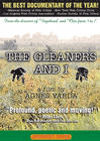FILM NOTES
FILM NOTES INDEX
NYS WRITERS INSTITUTE
HOME PAGE

 The Gleaners and I
The Gleaners and I
(France, 2000, 82 minutes, color, 35mm)
(in French w/English subtitles)
Directed by Agnès Varda
Cast:
Bodan Litnanski
Agnès Varda
François Wertheimer
The
following film notes were prepared for the New York State Writers
Institute by Kevin Jack Hagopian, Senior Lecturer in Media Studies
at Pennsylvania State University:
What happens to all that food?
The Gleaners and I began when director Agnès Varda began wondering about the whether the ancient practice of gleaning – following behind the harvest to glean the last ears of corn, grains of wheat, and beans that farmers had left behind in the rush to gather their crops. That sense of wonderment animates this lovely film. The Gleaners and I, it is called, and the title emphasizes the autobiographical element in this small, compassionate film. It is a late-career personal essay by a filmmaker whose personal touch was incubated in one of the most personal of all national cinemas, the French New Wave of the late 1950’s and early 1960’s. For Varda, the practice of gleaning is a place of eccentric resistance to a disturbingly over-concentrated society, a society in the grip of vast agribusiness combinations, soulless grocery stores, and biologically paranoid regulations that fetishize cleanliness. Varda sets out, in town and country, to find those who live, literally, hand to mouth. She and her little digital video camera watch them closely, always a strong, engaged presence.
There is something artisanal about the film, as well as about what it depicts. (Gleaning is a favorite subject of 19th century European painting, works of academic classicism surprisingly dear to Varda.). This is a homemade film about people who are pathologically individualistic, and for all its charm, there is about the film a wistfulness for a time when agriculture was the homeliest of the useful crafts, not the biggest of businesses, just as there is a nostalgia for the kind of handheld, small-scale filmmaking that the New Wave filmmakers made one of their trademarks. No shots more exemplify the coming together of these two traditions more than those in which the filmmaker shots her own hands. But Varda is a not a simple romanticist. Instead, she sees the recovery of the gleaning tradition as an opportunity to ruminate on the paradoxes of little people trying to carve little spaces for themselves out of a world that has given itself over to hugeness:
"This film is a documentary woven from various strands: from emotions I felt when confronted with precariousness; from the possibilities offered by the new small digital cameras; and from the desire to film what I can see of myself--my aging hands and my grey hair. I also wanted to express my love for painting. I had to piece it together and make sense out of it all in the film, without betraying the social issue that I had set out to address--waste and trash: who finds a use for it? How can one live on the leftovers of others?"
Varda finds that the new gleaners are still scavengers, as they have always been, but now they follow in the wake of giant grocery corporations and the vast collectivized farms of international agribusiness. They seek perfectly healthy food that bureaucracy or the profit motive of plain old wastefulness has caused to be discarded. Varda watches quietly as they find it.
Born in 1928, Varda began her directing career in 1954. Among her major works are Vagabond, Le Bonheur, and Cleo from 5 to 7. She is occasionally referred to as "the grandmother of the French New Wave," a vaguely patronizing reference to one of the most original and least sentimental talents in the history of French cinema.
The LA Weekly called this "a protest film that's part social critique, part travelogue, but always an unsentimental celebration of human resilience." But don’t expect that rip the lid off `em investigative piece. "Documentary," says Varda, "is a discipline that teaches modesty."
— Kevin Hagopian, Penn State University
For additional information, contact the Writers Institute at 518-442-5620 or online at https://www.albany.edu/writers-inst.